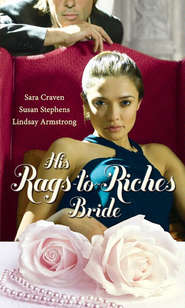По всем вопросам обращайтесь на: info@litportal.ru
(©) 2003-2024.
✖
Hot Nights with...the Italian: The Santangeli Marriage / The Italian’s Ruthless Marriage Command / Veretti's Dark Vengeance
Автор
Год написания книги
2019
Настройки чтения
Размер шрифта
Высота строк
Поля
Renzo rose from his chair and walked over to the window, lifting the slats of the blind to look out into the darkness. An image of a girl’s white face rose in his mind, her eyes blank and tearless, and a feeling that was almost shame twisted like a knife in his guts.
‘No,’ he said at last. ‘I do not.’
‘Then why not?’ his father demanded. ‘What can be the problem? Yes, the marriage was arranged for you, but so was my own, and your mother and I soon came to love each other deeply. And here you have been given a girl, young, charming, and indisputably innocent. Someone, moreover, you have known for much of your life. If she was not to your taste you should have said so.’
Renzo turned and gave him an ironic look. ‘It does not occur to you, Papa, that maybe the shoe is on the other foot and Marisa does not want me?’
‘Che sciocchezze!’ Guillermo said roundly. ‘What nonsense. When she stayed with us as a child it was clear to everyone that she adored you.’
‘Unfortunately, now she is older, her feelings are very different,’ Renzo said dryly. ‘Particularly where the realities of marriage are concerned.’
Guillermo pursed his lips in exasperation. ‘What can you be saying? That a man of your experience with women cannot seduce his own wife? You should have made duty a pleasure, my son, and used your honeymoon to make her fall in love with you all over again.’ He paused. ‘After all, she was not forced to marry you.’
Renzo gave his father a level look. ‘I think we both know that is not true. Once she’d discovered from that witch of a cousin how deeply she was indebted to our family she had little choice in the matter.’
Guillermo frowned heavily. ‘You did not tell her—explain that it was the dying wish of your mother, her madrina, that financial provision should continue to be made for her?’
‘I tried, but it was useless. She knew that Mama wanted us to marry. For her, it all seemed part of the same ugly transaction.’ He paused. ‘And the cousin also made her aware that when I proposed to her I had a mistress. After such revelations, the honeymoon was hardly destined to go well.’
‘The woman has much to answer for, it seems,’ Guillermo said icily. ‘But you, my son, were a fool not to have settled matters with the beautiful Lucia long before you approached your marriage.’
‘If stupidity were all, I could live with it,’ Renzo said with quiet bitterness. ‘But I was also unkind. And I cannot forgive myself for that.’
‘I see,’ his father said slowly. ‘Well, that is bad, but it is more important to ask yourself if your wife can be persuaded to forgive you.’
‘Who knows?’ Renzo’s gesture was almost helpless. ‘I thought a breathing space—time apart to consider what we had undertaken—would help. And at the beginning I wrote to her regularly—telephoned and left messages. But there was never any reply. And as the weeks passed the hope of any resolution became more distant.’ He paused, before adding expressionlessly, ‘I told myself, you understand, that I would not beg.’
Guillermo put his fingertips together and studied them intently. ‘A divorce, naturally, could not be countenanced,’ he said at last. ‘But from what you are telling me it seems there might be grounds for annulment?’
‘No,’ Renzo said harshly, his mouth set. ‘Do not be misled. The marriage—exists. And Marisa is my wife. Nothing can change that.’
‘So you say,’ his father commented grimly. ‘But you could be wrong. Your grandmother honoured me with a visit yesterday to inform me that your current liaison with Doria Venucci is now talked of openly.’
‘Nonna Teresa.’ Renzo bit out the name. ‘What a gratifying interest she takes in all the details of my life, especially those she considers less than savoury. And how could a woman with such a mind produce such a gentle, loving daughter as my mother?’
‘It has always mystified me too,’ Guillermo admitted. ‘But for once her gossip-mongering may be justified. Because she believes it can only be a matter of time before someone tells Antonio Venucci exactly how his wife has been amusing herself while he has been in Vienna.’
He saw his son’s brows lift, and nodded. ‘And that, my dear Lorenzo, could change everything, both for you and for your absent wife. Because the scandal that would follow would ruin any remaining chance of a reconciliation with her—if that is what you want, of course.’
‘It is what must happen,’ Renzo said quietly. ‘I cannot allow the present situation to continue any longer. For one thing, I am running out of excuses to explain her absence. For another, I accept that the purpose of our marriage must be fulfilled without further delay.’
‘Dio mio,’ Guillermo said faintly. ‘I hope your approach to your bride will be made in more alluring terms. Or I warn you, my son, you will surely fail.’
Renzo’s smile was hard. ‘No,’ he said. ‘Not this time. And that is a promise.’
However, Renzo was thoughtful as, later, he drove back to his apartment. He owned the top floor of a former palazzo, the property of an old and noble family who had never seen the necessity to work for their living until it was too late. But although he enjoyed its grace and elegance, he used it merely as a pied à terre in Rome.
Because the home of his heart was the ancient and imposing country house deep in the Tuscan countryside where he had been born, and where he’d expected to begin his married life in the specially converted wing, designed to give them all the space and privacy that newlyweds could ever need.
He remembered showing it to Marisa before the wedding, asking if she had any ideas or requirements of her own that could be incorporated, but she’d said haltingly that it all seemed ‘very nice’, and refused to be drawn further. And she had certainly not commented on the adjoining bedrooms that they would occupy after their marriage, with the communicating door.
And if she’d had reservations about sharing the house with her future father-in-law she hadn’t voiced those either. On the contrary, she’d always seemed very fond of Zio Guillermo, as she’d been encouraged to call him.
But then, Renzo thought, frowning, apart from agreeing to be his wife in a small wooden voice she hadn’t said too much to him at all. Something he should, of course, have noticed but for his other preoccupations, he conceded, his mouth tightening.
Besides, he was accustomed to the fact that she did not chatter unnecessarily from the days when she’d been a small, silent child, clearly overwhelmed by her surroundings, and through her years as a skinny, tongue-tied adolescent. A time, he recalled ruefully, when she’d constantly embarrassed him by the hero-worship she’d tried inexpertly to hide.
She hadn’t even cried at her own christening in London, which he’d attended as a sullenly reluctant ten-year-old, watching Maria Santangeli looking down, her face transfigured, at the lacy bundle in her arms.
His mother had met Lisa Cornell at the exclusive convent school they had both attended in Rome, and they had formed a bond of friendship that had never wavered across the years and miles that separated them.
But whereas Maria had married as soon as she left school, and become a mother within the year, Lisa had pursued a successful career in magazine journalism before meeting Alec Brendon, a well-known producer of television documentaries.
And when her daughter had been born only Maria would do as godmother to the baby. A role she had been more than happy to fill. The name chosen was naturally ‘Marisa’, the shortened form of Maria Lisa.
Renzo knew that, much as he had been loved, it had always been a sadness to his parents that no other children had followed him into the waiting nurseries at the Villa Proserpina. And this godchild had taken the place of the longed-for daughter in his mother’s heart.
He wasn’t sure on which visit to Italy she and Lisa Brendon had begun planning the match between their children. He knew only that, to his adolescent disgust, it seemed to have become all too quickly absorbed into family folklore as an actual possibility.
He’d even derisively christened Marisa ‘la cicogna’—the stork—a mocking reference to her long legs and the little beak of a nose that dominated her small, thin face, until his mother had called him to order with unwonted sternness.
But the fact that Marisa was being seriously considered as his future bride had been brought home to him six years ago, when her parents had been killed in a motorway pile-up.
Because, in a devastating aftermath of the accident, it had been discovered that the Brendons had always lived up to and exceeded their income, and that through some fairly typical oversight Alec had failed to renew his life insurance, leaving his only daughter penniless.
At first Maria had begged for the fourteen-year-old girl to be brought to Italy and raised as a member of their family, but for once the ever-indulgent Guillermo had vetoed her plan. If her scheme to turn Marisa into the next Santangeli bride was to succeed—and there was, of course, no guarantee that this would happen—it would be far better, he’d said, for the girl to continue her education and upbringing in England, at their expense, than for Renzo to become so accustomed to her presence in the household that he might begin to regard her simply as an irritating younger sister.
It was a proposition to which his wife had reluctantly acquiesced. And while Marisa had remained in England Renzo had been able to put the whole ridiculous idea of her as his future wife out of his mind.
In any case, he’d had to concentrate on his career, completing his business degree with honours before joining the renowned and internationally respected Santangeli Bank, where he would ultimately succeed his father as chairman. By a mixture of flair and hard work he had made sure he deserved the top job, and that no one would mutter sourly ‘boss’s son’ when he took over.
He was aware that the junior ranks of staff referred to him as ‘Il Magnifico’, after his namesake Lorenzo de Medici, but shrugged it off with amusement.
Life had been good. He’d had a testing job which provided exhilaration and interest, also allowing him to travel widely. And with his dynastic obligations remaining no more than a small cloud on his horizon he had enjoyed women, his physical needs deliciously catered to by a series of thoroughly enjoyable affairs which, the ladies involved knew perfectly well, would never end in marriage.
But while he’d learned early in his sexual career to return with infinite skill and generosity the pleasure he received, he’d never committed the fatal error of telling any of his innamoratas that he loved her—not even in the wilder realms of passion.
Then, three years ago, he had been shocked out of his complacency by his mother’s sudden illness. She’d been found to be suffering from an aggressive and inoperable cancer and had died only six weeks later.
‘Renzo, carissimo mio.’ Her paper-thin hand had rested on his, light as a leaf. ‘Promise me that my little Marisa will be your wife.’
And torn by sorrow and disbelief at the first real blow life had struck him, he had given her his word, thereby sealing his fate.
Now, as he walked into his apartment, he heard the phone ringing. He ignored it, knowing only too well who was calling, because the clinic would have used the private mobile number he’d left with them—which Doria Venucci did not have.
He recognised that, if he was to stand any chance of retrieving his marriage, she was a luxury he could no longer afford. However, courtesy demanded that he tell her in person that their relationship was over.
Not that she would protest too much. A secret amour was one thing. A vulgar scandal which jeopardised her own marriage would be something else entirely, he told himself cynically.













